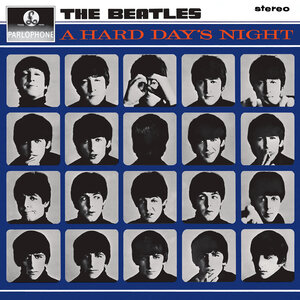
A Hard Day's Night is the third studio album by the English rock band the Beatles, released on 10 July 1964 by Parlophone, with side one containing songs from the soundtrack to their film of the same name. The American version of the album was released two weeks earlier, on 26 June 1964 by United Artists Records, with a different track listing that included selections from George Martin's film score. In contrast to the Beatles' first two albums, all 13 tracks on A Hard Day's Night were written by John Lennon and Paul McCartney, showcasing the development of their songwriting partnership.

Dhani Harrison is an English musician, composer and singer-songwriter. He is the only child of George and Olivia Harrison. Dhani debuted as a professional musician assisting in recording his father's final album, Brainwashed, and completing it with the assistance of Jeff Lynne after his father's death in November 2001. Harrison formed his own band, thenewno2, in 2002 and has performed at festivals, including Coachella, where Spin magazine dubbed their performance as one of the "best debut performances of the festival." The band also played Lollapalooza three times, with Harrison joining the festival's founder Perry Farrell on a cover of The Velvet Underground's "Sweet Jane" at 2010's event. In 2017, Harrison released his debut solo album IN///PARALLEL. The 2019 film IN///PARALIVE, showcases the live version of his debut solo album and was recorded in the round at Henson Studios in Los Angeles. Harrison's latest single, "Motorways ", was described by Rolling Stone as "a psychedelic track with a robust beat".

"Something" is a song by the English rock band the Beatles from their 1969 album Abbey Road. It was written by George Harrison, the band's lead guitarist. Together with his second contribution to Abbey Road, "Here Comes the Sun", it is widely viewed by music historians as having marked Harrison's ascendancy as a composer to the level of the Beatles' principal songwriters, John Lennon and Paul McCartney. Two weeks after the album's release, the song was issued on a double A-side single, coupled with "Come Together", making it the first Harrison composition to become a Beatles A-side. The pairing was also the first time in the United Kingdom that the Beatles issued a single containing tracks already available on an album. While the single's commercial performance was lessened by this, it topped the Billboard Hot 100 in the United States as well as charts in Australia, Canada, New Zealand and West Germany, and peaked at number 4 in the UK.
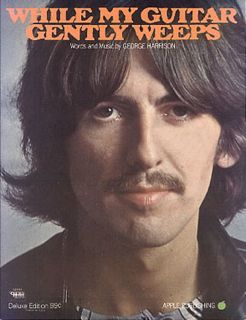
"While My Guitar Gently Weeps" is a song by the English rock band the Beatles from their 1968 double album The Beatles. It was written by George Harrison, the band's lead guitarist. Harrison wrote "While My Guitar Gently Weeps" as an exercise in randomness inspired by the Chinese I Ching. The song conveys his dismay at the world's unrealised potential for universal love, which he refers to as "the love there that's sleeping".

Abbey Road is the eleventh studio album by the English rock band the Beatles. It is the last album the group started recording, although Let It Be was the last album completed before the band's break-up in April 1970. It was mostly recorded in April, July and August 1969, and was released on 26 September 1969 in the United Kingdom, and 1 October 1969 in the United States, reaching number one in both countries. A double A-side single from the album, "Something" / "Come Together" was released in October, which also topped the charts in the US.
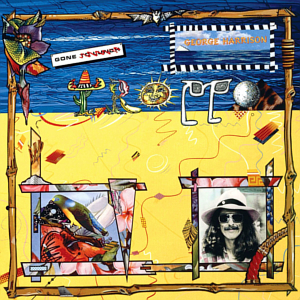
Gone Troppo is the tenth studio album by English rock musician George Harrison, released on 5 November 1982 by Dark Horse Records. It includes "Wake Up My Love", issued as a single, and "Dream Away", which was the theme song for the 1981 HandMade Films production Time Bandits. Harrison produced the album with Ray Cooper and former Beatles engineer Phil McDonald.
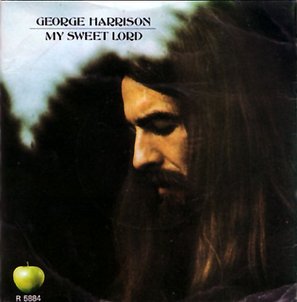
"My Sweet Lord" is a song by English musician George Harrison, released in November 1970 on his triple album All Things Must Pass. It was also released as a single, Harrison's first as a solo artist, and topped charts worldwide; it was the biggest-selling single of 1971 in the UK. In America and Britain, the song was the first number-one single by an ex-Beatle. Harrison originally gave the song to his fellow Apple Records artist Billy Preston to record; this version, which Harrison co-produced, appeared on Preston's Encouraging Words album in September 1970.

"Here Comes the Sun" is a song by the English rock band the Beatles from their 1969 album Abbey Road. It was written by George Harrison and is one of his best-known compositions. Harrison wrote the song in early 1969 at the country house of his friend Eric Clapton, where Harrison had chosen to play truant for the day to avoid attending a meeting at the Beatles' Apple Corps organisation. The lyrics reflect his relief at the arrival of spring and the temporary respite he was experiencing from the band's business affairs.

The Traveling Wilburys Vol. 1 is the debut studio album by the English-American supergroup Traveling Wilburys, comprising George Harrison, Jeff Lynne, Bob Dylan, Roy Orbison and Tom Petty. It was released in October 1988 to commercial success and critical acclaim. Although Harrison had long planned to start such a band, the project came about through happenstance. Harrison was in Los Angeles and in need of a B-side for a single from his Cloud Nine album, which resulted in the participants collaborating informally on the song "Handle with Care" at Dylan's home. Adopting alter egos as the five Wilbury brothers, they then recorded a full album, produced by Lynne and Harrison. It was the only Wilburys album to feature Orbison, who died suddenly of a heart attack less than two months after its release. The group continued as a four-piece after his death.
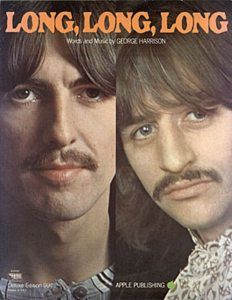
"Long, Long, Long" is a song by the English rock band the Beatles from their 1968 album The Beatles. It was written by George Harrison, the group's lead guitarist, while he and his bandmates were attending Maharishi Mahesh Yogi's Transcendental Meditation course in Rishikesh, India, in early 1968. Although Harrison later stated that he was addressing God in the lyrics, it is the first of his compositions that invites interpretation as both a standard love song and a paean to his deity.

"Love You To" is a song by the English rock band the Beatles from their 1966 album Revolver. The song was written and sung by George Harrison and features Indian instrumentation such as sitar and tabla. Following Harrison's introduction of the sitar on "Norwegian Wood " in 1965, it was the first Beatles song to fully reflect the influence of Indian classical music. The recording was made with minimal participation from Harrison's bandmates; instead, he created the track with tabla player Anil Bhagwat and other Indian musicians from the Asian Music Circle in London.

"I Want to Tell You" is a song by the English rock band the Beatles from their 1966 album Revolver. It was written and sung by George Harrison, the band's lead guitarist. After "Taxman" and "Love You To", it was the third Harrison composition recorded for Revolver. Its inclusion on the LP marked the first time that he was allocated more than two songs on a Beatles album, a reflection of his continued growth as a songwriter beside John Lennon and Paul McCartney.

"All Things Must Pass" is a song by English rock musician George Harrison, issued in November 1970 as the title track to his triple album of the same name. Billy Preston released the song originally – as "All Things (Must) Pass" – on his Apple Records album Encouraging Words (1970) after the Beatles had rehearsed the song in January 1969 but did not include it on their Let It Be album. The composition reflects the influence of the Band's sound and communal music-making on Harrison, after he had spent time with the group in Woodstock, New York, in late 1968. In his lyrics, Harrison drew inspiration from Timothy Leary's poem "All Things Pass", a psychedelic adaptation of the Tao Te Ching.
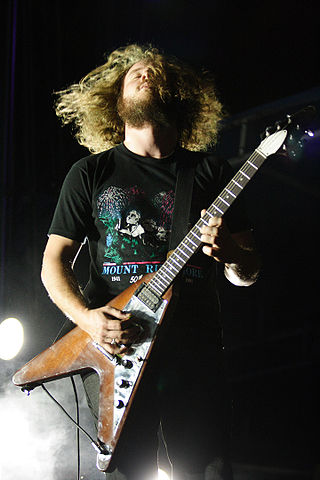
James Edward Olliges Jr., professionally known as Jim James or Yim Yames, is an American vocalist, guitarist, producer, and primary songwriter of the rock band My Morning Jacket. He has also released several solo albums.

"What Is Life" is a song by English rock musician George Harrison from his 1970 triple album All Things Must Pass. In many countries, it was issued as the second single from the album, in February 1971, becoming a top-ten hit in the United States, Canada and elsewhere, and topping singles charts in Australia and Switzerland. In the United Kingdom, "What Is Life" appeared as the B-side to "My Sweet Lord", which was the best-selling single there of 1971. Harrison's backing musicians on the song include Eric Clapton and the entire Delaney & Bonnie and Friends band, with whom he had toured during the final months of the Beatles. Harrison co-produced the recording with Phil Spector, whose Wall of Sound production also employed a prominent string arrangement by John Barham and multiple acoustic rhythm guitars, played by Harrison's fellow Apple Records signings Badfinger.
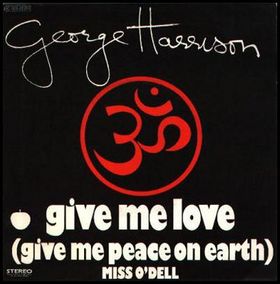
"Give Me Love " is a song by English musician George Harrison, released as the opening track of his 1973 album Living in the Material World. It was also issued as the album's lead single, in May that year, and became Harrison's second US number 1, after "My Sweet Lord". In doing so, the song pushed Paul McCartney and Wings' "My Love" from the top of the Billboard Hot 100, marking the only occasion that two former Beatles have held the top two chart positions in America. The single also reached the top ten in Britain, Canada, Australia and other countries around the world.

"Bangla Desh" is a song by English musician George Harrison. It was released as a non-album single in July 1971, to raise awareness for the millions of refugees from the country formerly known as East Pakistan, following the 1970 Bhola cyclone and the outbreak of the Bangladesh Liberation War. Harrison's inspiration for the song came from his friend Ravi Shankar, a Indian-Bengali musician, who approached Harrison for help in trying to alleviate the suffering. "Bangla Desh" has been described as "one of the most cogent social statements in music history" and helped gain international support for Bangladeshi independence by establishing the name of the fledgling nation around the world. In 2005, United Nations Secretary-General Kofi Annan identified the song's success in personalising the Bangladesh crisis, through its emotive description of Shankar's request for help.

"Ballad of Sir Frankie Crisp " is a song by English rock musician George Harrison from his 1970 triple album All Things Must Pass. Harrison wrote the song as a tribute to Frank Crisp, a nineteenth-century lawyer and the original owner of Friar Park – the Victorian Gothic residence in Henley-on-Thames, Oxfordshire, that Harrison purchased in early 1970. Commentators have likened the song to a cinematic journey through the grand house and the grounds of the estate.

New Multitudes is a Woody Guthrie tribute album performed by Jay Farrar, Will Johnson, Anders Parker, and Jim James to commemorate the 100th anniversary of Guthrie's birth, released through Rounder Records on February 28, 2012. The project was initiated by Woody's daughter Nora Guthrie to have Farrar add music to her father's lyrics—specifically, his earliest songwriting years in Los Angeles. Over the course of several years, he invited the others to collaborate and recorded at a variety of locations across the United States. Each artist wrote music to lyrics that inspired him and presented it to the collaborators for recording. The result is an album with diverse musical genres that has garnered positive reviews from critics for its varied styles and instrumentation. The quartet promoted the album with a small promotional tour that took them to record stores, radio programs, theaters, and folk festivals. The group has plans for releasing a second volume.
"Behind That Locked Door" is a song by English rock musician George Harrison from his 1970 triple album All Things Must Pass. Harrison wrote the song in August 1969 as a message of encouragement to Bob Dylan, who was making a highly publicised comeback to the concert stage, accompanied by the Band, with a headlining performance at the Isle of Wight Festival. "Behind That Locked Door" is a rare Harrison composition in the country music genre and the second song dealing with the friendship between himself and Dylan, after their 1968 collaboration "I'd Have You Anytime". Its lyrics address Dylan's elusive nature, and reflect the high regard in which Harrison held the American singer's work. The same reluctance on Dylan's part to re-engage with a concert audience led to him retreating again from live performance until August 1971, when he responded to Harrison's request to play at the Concert for Bangladesh.

















